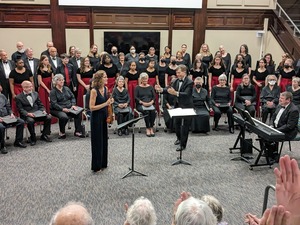Back by popular demand after its performance on March 11, the Choral Society of Durham presented a repeat of “Singing Sorrow, Singing Tomorrow,” featuring the Durham Children’s Choir. Under the direction of Rodney Wynkoop, the adult amateur chorus defied expectations in stirring performances of three exceptional contemporary works by living composers. (I use the term “amateur” only technically – the chorus is auditioned, but members still pay dues to participate.) Wynkoop has proven his dedication to expanding the diversity of both the choral community and its repertoire, even since retiring from his position as Duke University’s Director of Choral Music. Recent initiatives by the Choral Society include the 2021-established Wynkoop Fellowship Program, which aims toward “encouraging new members to join us on this journey” by making sure that finances are not a barrier to their participation.
The setting for this repeat performance was a little underwhelming – not to say that anything on the Duke University campus is unfit for performance, but the large chorus was packed into a lecture hall in the East Duke Building, and the accompaniment was played on an under-amplified electric piano. That said, accompanist David Cole achieved a beautiful sound in a less-than-ideal setting, even though his sounds were occasionally lost under the many voices.
Roland Marvin Carter‘s “Make some noise, get in trouble!” is a fun, rhythmic piece composed in memory of US House Representative John Lewis – specifically his monumental civil rights efforts. The vocalists entered with great power, moving between glorious harmonies and tense dissonances seamlessly, all with excellent diction that allowed for the separate lines in an impressive a capella section to layer yet still sparkle independently. The work takes inspiration from African-American Spiritual and American folksong, and cranks up the energy to create a jaunty, noisy celebration of sound.
Next up was a Durham-centric work that integrated projections of historic photos by Hugh Mangum. The photographs – including double-exposures and technically flawed photos that Mangum held onto for unknown reasons – had been donated to Duke’s Rare Book and Manuscript Library after languishing forgotten in an old barn. Decades later, they were painstakingly restored by Margaret Sartor and Alex Harris and released in their publication, Where We Find Ourselves. Composer Michael Bussewitz-Quarm has now composed a choral suite based on this work (sharing its title) to explore the reasoning behind Mangum’s storing of his flawed works, and to imagine the messages these long-forgotten people might have wanted to share with future generations.
The piece as a whole doesn’t stick to traditional phrase structure, with almost pointillistic moments in the piano accompaniment, haunting chords, and some really difficult multi-octave singing and uncomfortable intervals. Soloist Mark Garbrick lent his strong, rich voice to the voices of the past, along with some powerful and polished singing by the ensemble as a whole, despite the technical difficulty of the piece. Each movement of the work explores a different human element, with titles ranging from “Would You Know Me By My Hat?” to “Would You Know Me By My Scars?”. The chorus moved deftly between the varying tones of each section. Paired with a variety of Mangum’s photos, posed and candid, flawless and almost incomprehensibly flawed, the result was uniquely captivating.
The Durham Children’s Choir‘s Bel Canto ensemble (whose Artistic Director is Dena Byers) entered, along with violinist Dana Friedli, for the final work: Cecilia McDowall‘s Everyday Wonders: The Girl from Aleppo. This work chronicles the incredible true story of Syrian author Nujeen Mustafa, who escaped conflict in the Syrian Civil War from her hometown of Aleppo with her sister, travelling over 3500 miles by wheelchair until they found refuge in Germany. Kevin Crossley-Holland‘s text comes from Nujeen’s biography, capturing Nujeen’s own story through clever word painting, rhythmic effects, body percussion, and solo lines. Friedli’s tone was raw and emotional, laden with Middle-Eastern-inspired slides and step-and-a-half intervals, and soprano soloists Arianne Smith and Meghan Groth echoed the motives she presented throughout the work, depicting ghostly intrusive thoughts breaking into the narration. Smith and Groth’s singing soared hauntingly and beautifully over the chorus, who often split lines between the men, women, and children to great tonal effect. The performance ranged from recitative-style, lyric driven sections, to conflicted and bustling motion, to a lilting and then resounding triumph as the lyrics brought the story full-circle.
While some of the louder sections brought the parts out of balance and drowned out the (very small and not seemingly amplified) electric keyboard, the overall technical performance of these vocalists was impressive and effective. The programming was excellent, thought-provoking, and diverse within the contemporary choral genre and told a variety of interesting – and sometimes devastating – stories, all while continuing to inspire hope and instill joy, both in society and in the Durham choral scene.











